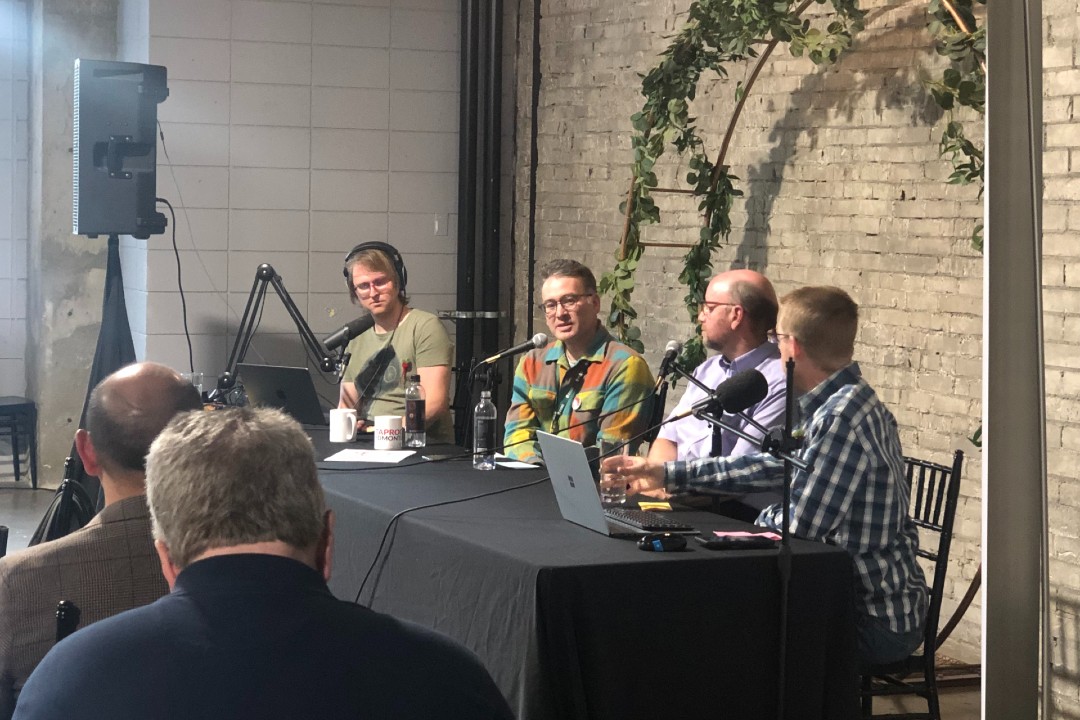Homelessness is an expected outcome of the country's housing system, according to the research lead at a University of Alberta housing lab.
"The normal functioning of our housing system produces homelessness," Joshua Evans of the Affordable Housing Solutions Lab told the audience during a live recording of Episode 266 of Speaking Municipally, Taproot's civic affairs podcast.
"We have a market-based system, and the market is really good at providing households that have that median income or higher with a really nice apartment or a really nice home," Evans said. "It's terrible at providing housing at market rates for those households that have the lowest incomes in our city."
Further, Evans said the homelessness that's visible on Edmonton's streets is the tip of the iceberg of a far larger housing "catastrophe."
"Beneath the surface are tens of thousands of households in Edmonton who face great difficulty affording the homes they're in and are at risk of homelessness themselves."
Evans also challenged a common sentiment that addiction, mental illness, and disability are causes of homelessness. These are precipitating factors that make someone vulnerable to homelessness, he said, but the lack of low-cost housing is the primary cause.
"That is the factor that explains homelessness from one city to the next, and it explains the rate of homelessness in a community more than any of these other factors," Evans said. "To address that we have to come up against some of the vested interests in the status quo of our existing housing system."
Joining Evans and co-hosts Mack Male and Troy Pavlek for the podcast was Eric Rice, a journalist, playwright, and researcher who's working with Taproot to better understand Edmonton's housing ecosystem.
Rice said his conversations with newcomers to Canada have revealed that many were surprised by the country's homelessness. "They thought we were a developed country — they saw pictures of West Edmonton Mall and our homes and thought there won't be homelessness here, there won't be poverty here," he said. "Then they got here and realized exactly how prevalent it was and wondered why we didn't care because we had the power to change it."
The primary way to fix homelessness, which has nearly doubled in Edmonton since 2016, is to build more subsidized housing, Evans said. Half of the social housing units in Canada were built before 1980. Evans said in the 1970s all levels of government agreed there was a government role in building social housing and that about 10% of new housing was subsidized. "In the 1990s, and since then, we've seen that consensus break down and deteriorate, and disappear altogether for a number of years," he said.

The May 30 Speaking Municipally live show focused on the housing crisis in Edmonton. From left to right, co-host Troy Pavlek, guests Joshua Evans and Eric Rice, and co-host Mack Male. (Stephanie Swensrude)
Evans noted a recent report from the parliamentary budget officer that said to reduce chronic homelessness by 50%, the federal government needs to invest an additional $3.5 billion per year. That's about seven times more than what the National Housing Strategy spends on average, he said.
On the municipal scale, Evans said he would like to see the City of Edmonton continue providing municipal lands for affordable housing projects. The city is currently working to build, convert, or renovate 2,600 units of affordable or mixed-market housing.
Evans also suggested cities can establish community land trusts, which are non-profit organizations that hold land and housing for the benefit of the surrounding community.
One way Rice has attempted to address homelessness is by establishing the Affordable Housing Sustainability Fund. The money will help fund repairs to social housing. One-third of social housing units in Alberta are in poor condition, according to the Canadian Mortgage and Housing Corporation.
Rice would like to see municipal governments listen to people with experience being homeless. "We don't necessarily prioritize people and I think we can see that in the encampment cleanouts," Rice said. "I think we can see that in the way that highrises are slowly being built over the very land that people were struggling to live on." He also suggested volunteering with organizations like Operation Friendship Seniors Society to learn from people experiencing homelessness.
Hear more about possible solutions to the housing crisis on the June 1 episode of Speaking Municipally.
